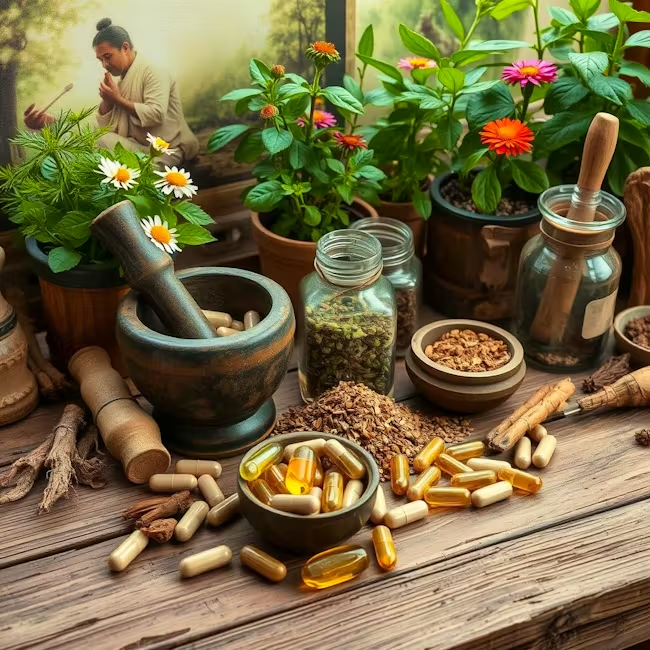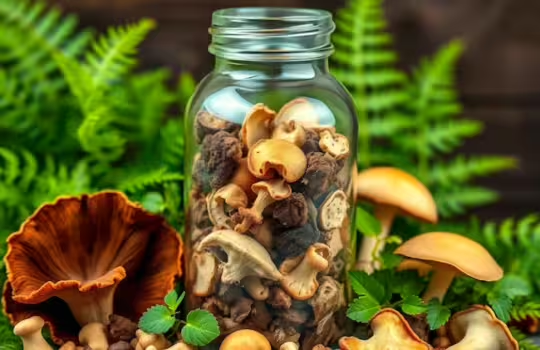The Power of Botanical Compounds in Traditional Medicine Exploring Herbal Supplements

For centuries, people have turned to nature for remedies to heal their bodies and minds. Plant-based extracts, in particular, have been a cornerstone of traditional medicine, offering a wealth of health benefits and natural alternatives to conventional treatments. As we continue to seek out more holistic approaches to wellness, the use of botanical compounds in herbal supplements has experienced a resurgence in popularity. But what exactly are these powerful plant extracts, and how can they be used to support our overall health and wellbeing?
1. The Rise of Botanical Compounds in Traditional Medicine
For centuries, botanical compounds have been used in traditional medicine to prevent and treat various health conditions. Natural remedies have been a cornerstone of healthcare in many cultures, with plants and herbs being used to create medicines that promote overall well-being. In recent years, there has been a resurgence of interest in botanical compounds, driven in part by the growing demand for holistic and alternative approaches to healthcare.
One of the key factors contributing to the rise of botanical compounds is the increasing recognition of their therapeutic potential. Many plants and herbs have been found to possess unique properties that make them effective in preventing and treating various health conditions. For example, turmeric has been shown to have potent anti-inflammatory and antioxidant properties, while ginger has been found to have anti-inflammatory and digestive benefits.
The use of botanical compounds in traditional medicine has also been driven by the growing awareness of the importance of preventive care. Many people are now seeking out natural remedies as a way to maintain their health and prevent illness, rather than simply treating symptoms. This shift towards preventive care has led to an increased demand for herbal supplements and other botanical-based products.
Furthermore, advances in scientific research and technology have made it possible to better understand the properties and effects of botanical compounds. This has led to the development of more effective and targeted treatments, as well as a greater understanding of the potential interactions between botanical compounds and other medications.
Overall, the rise of botanical compounds in traditional medicine reflects a growing interest in natural and holistic approaches to healthcare. As research continues to uncover the therapeutic potential of plants and herbs, it is likely that botanical compounds will play an increasingly important role in the prevention and treatment of various health conditions.
2. Unlocking the Potential of Plant-Based Extracts: A Brief History
The use of plant-based extracts in traditional medicine dates back thousands of years, with ancient civilizations such as the Egyptians, Chinese, and Greeks utilizing herbs and plants to treat various ailments. Traditional knowledge and folklore played a significant role in the development of botanical medicine, with many cultures passing down their understanding of plant-based remedies through generations.
One of the earliest recorded uses of plant-based extracts was in ancient China, where emperor Shennong is said to have discovered the medicinal properties of tea leaves around 2700 BC. Similarly, in ancient Greece, Hippocrates, known as the father of medicine, used plant-based extracts to treat various diseases and injuries. The use of plant-based extracts continued to evolve throughout history, with many cultures contributing to our understanding of botanical medicine.
The modern era of botanical medicine began to take shape in the 19th century, when scientists started to isolate and analyze the active compounds found in plants. This led to the discovery of many important botanical compounds, such as quinine, which is derived from the bark of the cinchona tree and is used to treat malaria. Today, the use of plant-based extracts continues to play a vital role in traditional medicine, with many modern pharmaceuticals being derived from botanical compounds.
Despite the advances in modern medicine, the use of plant-based extracts remains an essential part of traditional medicine, with many people around the world relying on botanical compounds to treat various health conditions. By understanding the history and evolution of botanical medicine, we can better appreciate the importance of plant-based extracts in traditional medicine and their potential to improve our health and well-being.
3. The Science Behind Botanical Compounds: What Makes Them Effective
The effectiveness of botanical compounds in traditional medicine can be attributed to their unique composition and the way they interact with the human body. At the core of these compounds are bioactive molecules, such as alkaloids, flavonoids, and terpenoids, which are responsible for their medicinal properties.
When ingested, these bioactive molecules are absorbed into the bloodstream and interact with various biological pathways, influencing the body’s physiological responses. For instance, some botanical compounds have anti-inflammatory properties, while others exhibit antioxidant or antimicrobial activities. The diversity of these bioactive molecules allows botanical compounds to address a wide range of health concerns, from digestive issues to mental health.
Another key factor contributing to the effectiveness of botanical compounds is their ability to interact with the body’s endocrine system. The endocrine system plays a crucial role in regulating various bodily functions, including stress response, metabolism, and hormone balance. Botanical compounds can modulate the activity of hormones, such as insulin and cortisol, which can have a profound impact on overall health and well-being.
Furthermore, the synergistic effects of botanical compounds should not be overlooked. When multiple bioactive molecules are present in a single compound, they can interact with each other and with the body’s biological systems in complex ways, leading to enhanced therapeutic effects. This synergy is thought to be responsible for the observed benefits of botanical compounds, which often exceed the sum of their individual components.
By understanding the science behind botanical compounds, we can better appreciate their potential as therapeutic agents and harness their power to promote health and well-being.
4. Top Botanical Compounds Used in Traditional Medicine and Their Benefits
Traditional medicine has long relied on botanical compounds to treat a variety of health issues. From ancient civilizations to modern times, these plant-based extracts have been used to promote well-being and alleviate suffering. In this section, we will explore some of the top botanical compounds used in traditional medicine and their benefits.
Turmeric/Curcumin: This golden spice has been used for centuries to treat inflammation and pain. Curcumin, a powerful compound found in turmeric, has potent anti-inflammatory and antioxidant properties, making it an effective treatment for arthritis, digestive issues, and even cancer.
Ginger: Ginger has been used in traditional medicine for its anti-inflammatory properties, which can help alleviate nausea, digestive issues, and pain. It is also known to have antimicrobial properties, making it effective against colds and flu.
St. John’s Wort: This herb has been used for centuries to treat mild depression, anxiety, and sleep disorders. Its active compound, hyperforin, has been shown to increase the levels of neurotransmitters such as serotonin and dopamine, which help regulate mood and emotional response.
Garlic: Garlic has been used in traditional medicine to treat a range of health issues, including high blood pressure, high cholesterol, and even cancer. Its active compound, allicin, has been shown to have antibacterial, antiviral, and antifungal properties, making it effective against infections and diseases.
Valerian Root: This herb has been used for centuries to treat insomnia, anxiety, and restlessness. Its active compounds have been shown to promote relaxation, reduce stress, and improve sleep quality.
5. Challenges and Concerns in the Use of Herbal Supplements: Separating Fact from Fiction
As with any natural remedy, there are several challenges and concerns associated with the use of herbal supplements. While some concerns are valid, others may be exaggerated or even fueled by misinformation. It’s essential to separate fact from fiction to ensure safe and effective use of herbal supplements.
One of the primary concerns is the lack of standardization in the herbal supplement industry. This means that different products may contain varying levels of active ingredients, which can affect their efficacy and safety. Additionally, the interaction between herbal supplements and prescription medications can be a concern, as some herbal supplements may enhance or inhibit the effects of certain medications.
Another challenge is the availability of adulterated products, which can contain heavy metals, pesticides, or other contaminants. This highlights the importance of choosing a reputable brand that adheres to good manufacturing practices (GMPs) and third-party testing.
Some people may also be concerned about the regulatory environment surrounding herbal supplements. While it’s true that the industry is not as heavily regulated as the pharmaceutical industry, many reputable brands are committed to adhering to strict quality control measures and testing protocols.
To address these concerns, it’s crucial to do your research and choose a brand that prioritizes quality, safety, and transparency. Look for products that have been tested by third-party organizations, and be wary of exaggerated claims or products that seem too good to be true. By being informed and taking a responsible approach, you can harness the benefits of herbal supplements while minimizing the risks.
6. Tips for Choosing the Right Herbal Supplements and Ensuring Quality
Choosing the right herbal supplements can be a daunting task, especially for those new to the world of traditional medicine. With so many options available, it’s essential to know what to look for to ensure you’re getting high-quality products that meet your needs. Here are some valuable tips to help you make informed decisions:
When selecting herbal supplements, look for products that have been **third-party tested** and verified to ensure their purity and potency. This step can help you avoid products that may be contaminated or adulterated with fillers or other substances.
Another crucial factor to consider is the **source of the herbs**. Choose products that use herbs that are sustainably sourced and cultivated using organic or wildcrafted methods. This not only ensures the quality of the herbs but also supports environmentally friendly practices.
Check the label carefully and make sure the product contains the right amount of the active compounds. Be wary of products that make exaggerated claims or promise quick fixes. Also, be aware of potential interactions with other medications you may be taking.
It’s also essential to **research the manufacturer** and look for products that are made by reputable companies with a history of producing high-quality supplements. Check online reviews and ask for recommendations from healthcare professionals or other trusted sources.
Finally, consult with a healthcare professional before taking any new supplements, especially if you have any underlying health conditions or are pregnant or breastfeeding. They can help you make informed decisions and ensure your safety.
By following these tips, you can increase your chances of choosing high-quality herbal supplements that meet your needs and support your overall well-being.
7. Embracing a Future of Botanical Medicine: The Future of Traditional Medicine and Herbal Supplements
As we look to the future of traditional medicine and herbal supplements, it’s clear that botanical compounds will play a significant role. With the increasing demand for natural and holistic approaches to health, the market for herbal supplements is expected to continue growing. By 2025, the global herbal supplements market is projected to reach $93.4 billion, up from $35.4 billion in 2020.
This growth is driven in part by the rising awareness of the benefits of botanical compounds, as well as the increasing availability of high-quality herbal supplements. As more people turn to natural health solutions, the demand for products that are safe, effective, and sustainably sourced will continue to drive innovation in the industry.
Advances in technology and manufacturing will also play a key role in shaping the future of botanical medicine. Nanotechnology and bioavailability-enhancing delivery systems are just a few examples of the technologies that will help unlock the full potential of botanical compounds.
Furthermore, the integration of traditional medicine with modern healthcare systems will become more prevalent. This will involve increased collaboration between healthcare professionals and herbalists, as well as the development of new standards and regulations for the industry.
Ultimately, the future of botanical medicine holds great promise for those seeking natural and holistic approaches to health. As the industry continues to evolve, we can expect to see more innovative products, more informed consumers, and a greater emphasis on safety, efficacy, and sustainability.


